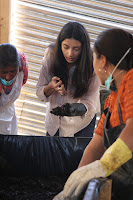Social Is
Guess who's back! Guess who's back, guess who's back, guess who's back, duh na na da ni da de woo. That's right, I'm back.
Today we've got some more on what social is. Bright B. Simons, stationed in Ghana, and writing for HBR, remarked:
The difference in results between profit seekers and change seekers is apparent. Traditional entrepreneurs go wherever the money is SocEnters go wherever the change is.
That being said, SocEnt isn't all sunny days and happy time, even though there are a whole lot of superheros. Liam Black, renowned British Socenter, pointed seven deadly sins of the field in the Social Enterprise Conference 2012.
Today we've got some more on what social is. Bright B. Simons, stationed in Ghana, and writing for HBR, remarked:
When social entrepreneurs say that they want to "work themselves out of a job" they are not making a glib statement to sound cool. They are merely stating the obvious — they want to fundamentally solve the problem that their solution is designed to address.He adresses one of the fundamental attributes of SocEnters – they want to solve problems – not keep that problem alive and milk it for all its worth. He goes on:
True, some commercial/traditional entrepreneurs invest substantially in research too. But only to assure themselves that someone will pay enough to make the development of the solution worthwhile. That the person paying the price sufficiently benefits is actually secondary. What matters is that he's willing to pay.
The difference in results between profit seekers and change seekers is apparent. Traditional entrepreneurs go wherever the money is SocEnters go wherever the change is.
That being said, SocEnt isn't all sunny days and happy time, even though there are a whole lot of superheros. Liam Black, renowned British Socenter, pointed seven deadly sins of the field in the Social Enterprise Conference 2012.
Deadly sin #1: the belief that speaking at conferences, blogging, and tweeting are entrepreneurial activities
They're not. Don't be fooled into thinking that the blog you wrote last week that garnered a few dozen hits after you posted it on Facebook is making the tiniest dent in the problem you're trying to solve. This stuff is background noise, and it's important – but it's not going to change the world.



Comments
Post a Comment